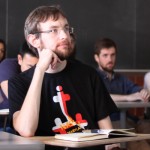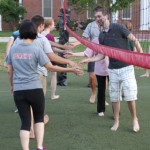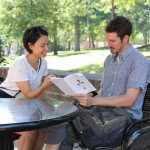North American Summer School for Logic, Language and Information In Review
Maryland hosted 80 students of linguistics, philosophy, and computer science from all parts of the world at the 6th North American Summer School in Logic, Language and Information (NASSLLI) from June 21-27. The students were treated to a week of advanced courses taught by two dozen top faculty – including Larry Moss (IU), James Pustejovsky (Brandeis), Frank Veltman (U of Amsterdam) and Angelika Kratzer (U of Massachusetts). Participants also enjoyed the opportunity to meet the current and next generations of leaders in their fields over coffee and cookies, a Burmese dinner banquet, and a tournament of Semantic Valueball (a local sport that approaches volleyball in the limit). With the guidance of faculty organizers Eric Pacuit, Valentine Hacquard, and Alexander Williams, plus a crew of dedicated students in Linguistics and Philosophy, the Summer School was an intellectual and social success. Says Yoad Winter, Professor of Modern Languages at Utrecht, who taught “Introduction to Formal Semantics” at NASSLLI: “It was a very pleasurable summer school, and the organization was perfect! Also, perhaps most importantly, the interaction with the students was at a very high level. Very nice production!”
Courses were sorted into five tracks: Semantics, Grammar, Language and Computation, Probability and Games, and Philosophical Logic, with 2–5 classes in each area. Two of the most popular courses, attended by a majority of the students, were Angelika Kratzer’s “Mapping Possibilities in the Grammars of Natural Languages” and Frank Veltman’s “Topics in Update Semantics.”
The success of this NASSLLI will have positive effects for both students and faculty in logic and language at Maryland. Many prominent researchers in linguistics, philosophy and computer science have gained a new appreciation of what goes on in these areas at Maryland. The event also developed and solidified collegial relations among faculty that will lead to cooperative exchanges in the future. Our students — whose intelligence and efficiency was much remarked on throughout the week — similarly made promising connections both with their own cohort, and with faculty in their areas of interest. In short, UMD made a lasting and positive impression.










